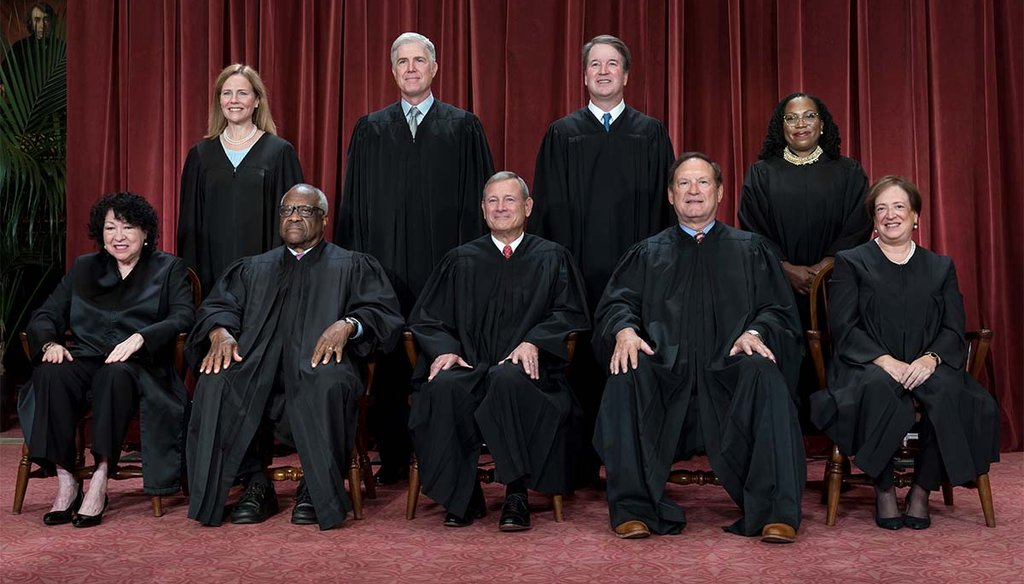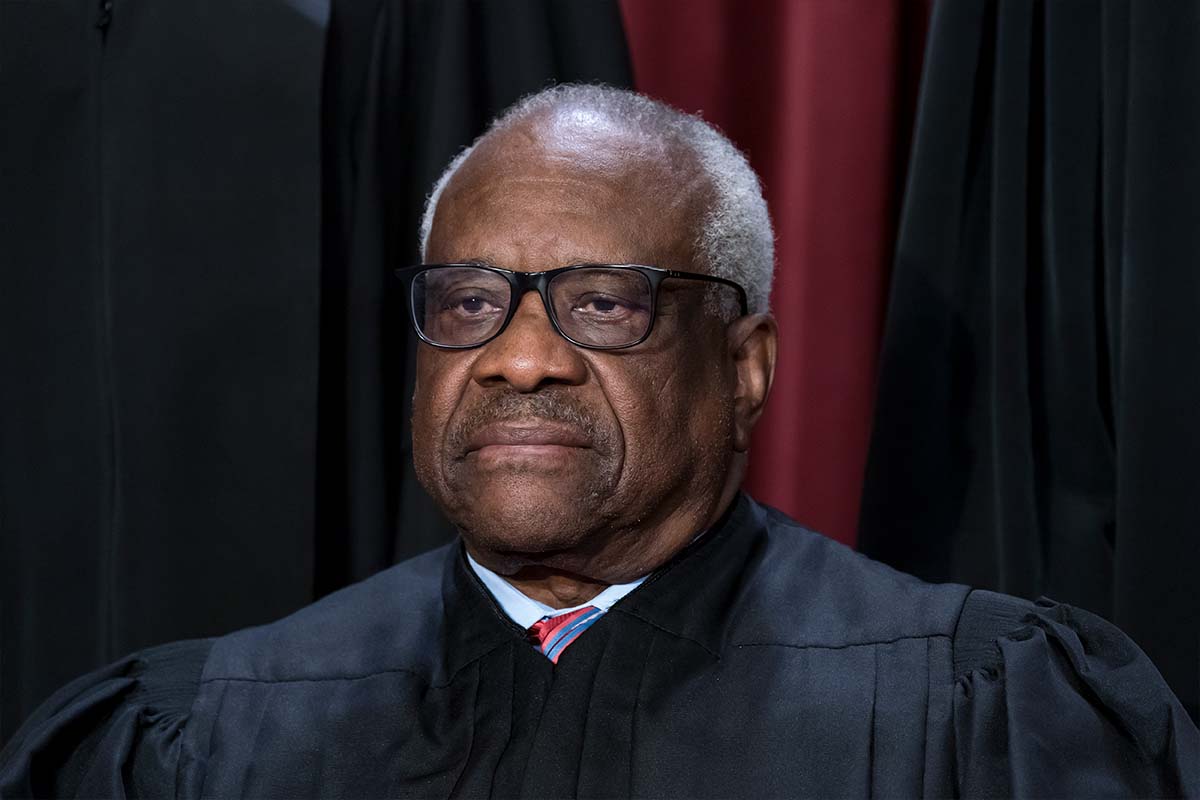Stand up for the facts!
Our only agenda is to publish the truth so you can be an informed participant in democracy.
We need your help.
I would like to contribute

The Supreme Court sits for a portrait Oct. 7, 2022. (AP)
If Your Time is short
-
ProPublica reported April 6 that U.S. Supreme Court Justice Clarence Thomas accepted tens of thousands of dollars in gifts from a Texas billionaire without including them on financial disclosures. The story renewed calls for the court to adopt a formal ethics code.
-
Although the court is subject to some federal laws governing gift disclosure, it has no formal code of ethics.
-
Some legislators and judicial reform advocates have asked Congress to create and pass a code for the court, or to mandate that the high court formally adopt a code already used by the lower courts. But scholars said imposing a code may be unconstitutional and would be hard to enforce.
A ProPublica report that Supreme Court Justice Clarence Thomas accepted luxury trips from a high-profile Republican donor without disclosing them prompted a fresh flurry of criticism from Democrats and raised a question: Does the Supreme Court have a formal ethics code?
The answer is no, although the executive and legislative branches do.
Federal laws, some of which were recently tightened, require Supreme Court justices to report gifts valued at more than a few hundred dollars. But there are no official ethics standards for the Supreme Court as there are for lower courts.
ProPublica’s April 6 report said that across two decades, Thomas and his wife, Ginni, took gifts from Harlan Crow, a conservative billionaire based in Dallas, that included private jet and yacht travel to destinations including the Adirondacks and Indonesia. ProPublica said although some of these gifts were worth more than $500,000, Thomas disclosed none of them.
In an April 7 statement, Thomas said fellow justices and other federal judges had advised him that he wasn’t required to disclose "personal hospitality from close personal friends, who did not have business before the Court."
The revelations rankled some Democrats. On April 7, Sen. Sheldon Whitehouse, D-R.I., who chairs the Senate Judiciary Courts Subcommittee, tweeted, "As long as 9 justices are exempt from any process for enforcing basic ethics, public faith in SCOTUS will continue to decline." (SCOTUS is shorthand for Supreme Court of the United States.)
Further complicating the issue, ProPublica reported April 13 that one of Crow’s companies in 2014 purchased several properties in Savannah, Georgia, from Thomas, his mother and the family of Thomas’ late brother.
Justices and other officials must, by federal law, disclose the details of most real estate sales exceeding $1,000. But Thomas didn’t disclose selling the Savannah properties, ProPublica reported.
Groups including the American Bar Association have called for the Supreme Court to adopt an ethics code to align itself with other judges and lawyers and burnish its credibility with the American public.
"How do you explain to the American people when they discover that every part of our government structure, all the other agencies, have codes of conduct, but the United States Supreme Court does not?" said James Williams, the Washington state delegate to the American Bar Association, who introduced a resolution to have the court adopt an ethics code.
Gabe Roth, executive director of Fix the Court, a nonprofit advocacy group, said there should be a set of principles the justices promise to follow and an internal ethics office at the court to help within the justices consistently manage ethical questions.
"I think (adopting a code) would send a message that the justices are not above the law, nor are they too important or special to adopt the types of rules and practices that govern the conduct of every other judge in the country," Roth said.
Existing rules are limited
The Judicial Conference, the policymaking body for federal courts, adopted the Code of Judicial Conduct in 1973. It asks judges to uphold canons regarding integrity and independence; avoiding impropriety; fairness and impartiality and extrajudicial activities. It also asks judges to refrain from political activity.
The code is intended as a guide; it doesn’t list penalties for breaches and says not every violation should lead to disciplinary action. Instead, it says disciplinary action should depend on the seriousness of the violation, the intent of the judge who committed it, whether it’s part of a pattern of behavior and whether it affects the judicial system.
As the nonpartisan Congressional Research Service has said, the Judicial Conference’s code governs the behavior of most federal judges but doesn’t explicitly apply to U.S. Supreme Court justices.
"Although the Justices consult the Code, along with other sources, for guidance when performing their judicial duties, the Court is not presently subject to a defined body of general ethical rules," the service said in an April 2022 report covering a potential code’s legal outcomes.
Under rules in the Ethics Reform Act of 1989, which updated a law passed after the Watergate scandal, federal judges — including Supreme Court justices — must annually report all gifts worth more than $415, identify the source of the gifts and disclose travel locations, dates, and expenses for travel-related reimbursements. Judges also must reject gifts from people with business before the court.
A Judicial Conference subcommittee in March tightened gift disclosure rules for Supreme Court justices, requiring them to report free stays at commercial properties and travel by private jet. The rules don’t cover gifts of overnight stays at friends’ vacation homes, which came into play in Thomas’ case. Thomas has said Crow and his wife were "dearest friends."
Ethics experts said that until the March rule shift, a "personal hospitality" exemption could be read ambiguously.
The recent gift disclosure revisions followed calls from some lawmakers, including Whitehouse, for the high court to follow standards similar to those for the legislative and executive branches of government.
Supreme Court Justice Clarence Thomas has been under scrutiny for accepting gifts from a Texas billionaire without disclosing them. (AP)
A portfolio of proposals
On April 7, Whitehouse and Rep. Hank Johnson, D-Ga., who is the ranking member of the House Judiciary Subcommittee on Courts, joined 10 Democratic senators and 10 Democratic representatives in writing to the Supreme Court, asking Chief Justice John Roberts to investigate Thomas’ gift taking.
Before ProPublica’s disclosure, the Los Angeles Times had in 2004 cataloged gifts Thomas had received from third parties including Crow, which included a bust of President Abraham Lincoln valued at $15,000 and a Bible once owned by abolitionist Frederick Douglass, valued at $19,000.
Other justices have faced legislative scrutiny for third-party-subsidized travel. The New York Times reported that Antonin Scalia, who died in February 2016, took more than 250 subsidized trips from 2004 to 2014, and Justice Stephen Breyer, who retired from the court in June 2022, took 185 such trips.
In 2019, Open Secrets, a nonprofit advocating for government transparency, said that since 2004, Supreme Court justices had taken 1,306 trips other people had subsidized.
Over the years, legislators proposed instituting codes of conduct for Supreme Court justices, calls that intensified in 2021 following revelations that Ginni Thomas exchanged text messages with former White House Chief of Staff Mark Meadows, urging him to work to overturn the 2020 presidential election results.
Efforts to have the Supreme Court adopt an ethics code include:
-
Rep. John Sarbanes, D-Md., has twice introduced in the House the For The People Act, which included a Supreme Court ethics code among voting and other provisions. The measure passed the House each time but was first blocked in the Senate and later tabled after a roll call vote in that chamber.
-
Whitehouse, who has long pushed for a Supreme Court ethics code, joined Sen. Lindsey Graham, R-S.C., twice in 2021 to write Roberts calling for the court to align with lower courts’ disclosure policies.
-
In May 2022, the Democratic-led House Judiciary Committee voted 22-16 on a bill to require the justices to adopt disclosure rules covering travel, gifts, and income. There has been no further action on the measure.
For the May vote, Republicans, particularly Rep. Jim Jordan, R-Ohio, objected.
"Don't let them fool you," Jordan told Roll Call, referring to Democrats facing the Supreme Court’s 6-3 conservative supermajority. "This isn't about ethics, this is an insurance policy for them when things don't go their way."
In his 2011 year-end report on the federal judiciary, Roberts wrote that although the court "consulted" the Judicial Conference code the lower courts follow, the conference’s committees have "no mandate to prescribe rules or standards for any other body." However, perhaps signaling a change of heart for Roberts, Justice Elena Kagan, said during a March 7, 2019, House Appropriations Committee hearing that the chief justice was studying whether the court would adopt an ethics code.
Sen. Dick Durbin, D-Ill., said April 10 that the Senate Judiciary Committee he chairs will hold a hearing about "the need to restore confidence in the Supreme Court's ethical standards."
Constitutional questions
Some scholars have said Congress has the constitutional authority to regulate judicial ethics.
The court has followed other congressionally enacted laws that affect ethical practices, including the 1978 Ethics in Government Act, requiring the justices to file annual financial disclosure reports, and the 2022 Courthouse Ethics and Transparency Act, requiring justices to post their annual disclosures in an online database.
But other legal experts have raised questions about the wisdom and legality of adopting a Supreme Court ethics code.
In February, Harvard Law School professor Noah Feldman asked in a Bloomberg News article whether such a code would subject the justices to problematic oversight.
"As a practical matter, a code might encourage politicized harassment of the justices without truly subjecting them to any real source of external authority," Feldman wrote.
He added that a supervisory body could try to influence the outcome of Supreme Court cases and couldn’t remove justices from the bench. Only impeachment and conviction by the Senate could do that.
Enforcement questions
Steven Lubet, an emeritus law professor at Northwestern University, said enforcing any code would be challenging.
"There is no enforcement mechanism in the current … situation, in which the justices say they voluntarily follow gift disclosure and other rules," Lubet said.
Stephen Gillers, a professor emeritus at the New York University School of Law, wondered whether the court would accept a code and whether Roberts would enforce it if the justices objected to its tenets.
"What buy-in would the court need to adopt a code that binds all justices?," he asked. "Who would enforce it? Lower court judges whose opinions the justices review? Not likely to work. Or will the court as a whole pass on the conduct of a fellow justice? Will that be credible?"
Gillers said he doubted the recent outcry over Thomas would force the court to change.
"Six months ago, I would have rated it as very unlikely (1 in 20) that the court will adopt its own code; I think the Court would not want to be seen to react to public pressure," he said. "Now, after the latest Thomas story, I think it is just unlikely (1 in 4/5) but increasingly possible."
PolitiFact Researcher Caryn Baird contributed to this report.
Our Sources
Los Angeles Times, Justice Thomas reports wealth of gifts, Dec. 31, 2004
Chicago Tribune, Thomas tops justices in accepting outside gifts, Dec. 31, 2004
The Washington Post, Supreme Court justices tell Congress they are not considering televising hearings, March 7, 2019
U.S. Courts, Code of Conduct for United States Judges, March 12, 2019
C-SPAN, Supreme Court fiscal year 2020 budget, March 7, 2019
Brookings Institution, What’s so hard about regulating Supreme Court justices’ ethics? — A lot, Nov. 28, 2011
Justice John G. Roberts, 2011 Year-end report on the federal judiciary, Dec. 31, 2011
Valparaiso University Law Review, Supreme Court leaks and recusals, summer 2013
Congress.gov, For the People Act of 2019, Jan. 3, 2019
Time, Why we need a code of ethics for the Supreme Court, Oct. 1, 2019
Congress.gov, For the People Act of 2021, March 11, 2021
U.S. Courts, Guide to judiciary policy, July 27, 2021
CNBC, Senate Republicans block Democrats’ sweeping voting, ethics bill, June 22 2021
The Hill, The Supreme Court needs a code of ethics. Feb. 10, 2022
Congressional Research Service, A code of conduct for the Supreme Court? Legal questions and considerations, April 6, 2022
Congress.gov, Supreme Court Ethics, Recusal, and Transparency Act of 2022, May 11, 2022
PolitiFact, Who is Ginni Thomas, and why does the Jan. 6 committee want to talk to her?, Sept. 23, 2022
Jurist, Should the Supreme Court have an ethics code?, Dec. 9, 2022
The Washington Post, Supreme Court justices discussed, but did not agree on, code of conduct, Feb. 9, 2023
The New York Times, Supreme Court weighs ethics code as critics push for change, Feb. 9. 2023
The Washington Post, Ethics code wouldn’t fix Supreme Court’s legitimacy crisis, Feb. 14, 2023
Sen. Sheldon Whitehouse, D-R.I., As SCOTUS ducks ethics questions, Whitehouse calls for update on personal hospitality rules for federal judges. Feb. 22, 2023
American Bar Association, Supreme Court justices should follow binding code, Feb. 27, 2023
The Washington Post, Supreme Court justices under new ethics disclosures on trips, other gifts, March 28, 2023
The New York Times, Justices must disclose travel and gifts under new rules, March 29, 2023
Harvard Gazette, Time for Supreme Court to adopt ethics rules? March 29. 2023
Fox News, Clarence Thomas report spurs new calls from Democrats for Supreme Court code of ethics, April 6, 2023
Sen. Sheldon Whitehouse, D-R.I., tweet, April 6, 2023
Rep. Alexandria Ocasio Cortez, D-N.Y., tweet, April 6, 2023
Sen. Dick Durbin, D-Ill., tweet, April 6, 2023
MarketWatch, Clarence Thomas says he was advised he didn’t need to disclose GOP donor’s gifts but will change his approach on disclosures, April 7, 2023
ProPublica, Clarence Thomas defends undisclosed "family trips" with GOP megadonor. Here are the facts, April 7, 2023
Forbes, Clarence Thomas Calls Harlan Crow and wife ‘personal friends’ who provided private jet and trips on superyacht, April 7, 2023
The Washington Post Opinion, It’s time for Clarence Thomas to come clean, April 7, 2023
New York magazine Intelligencer, Clarence Thomas: Sorry I got caught, April 7, 2023
Sen. Sheldon Whitehouse, D-R.I., Whitehouse and Johnson lead letter to chief justice calling for investigation of Justice Thomas’s extravagant billionaire-funded trips, April 7, 2023
The Wall Street Journal, The smearing of Clarence Thomas. April 7, 2023
Cornell Law School, U.S. Code § 7353 - Gifts to Federal employees, accessed April 7, 2023
Politico, Justice Clarence Thomas defends ‘family trips’ with GOP donor, April 7, 2023
NBC News, Clarence Thomas says trips paid for by billionaire were 'personal hospitality,' not business, April 7, 2023
Fortune, The Clarence Thomas scandal isn’t about breaking the law: It shows how broken ethics standards are on the Supreme Court, April 7, 2023
The Hill, Democrats ask chief justice to investigate Clarence Thomas trips: ‘It is your duty,’ April 8, 2023
NPR, What the revelations about Justice Clarence Thomas mean for the Supreme Court, April 8, 2023
NPR, Why it's unlikely ethics rules on Supreme Court gift disclosures will work, April 10, 2023
NPR, Senate panel will hold a hearing on the Supreme Court's ethical standards, April 10, 2023
Justice Department, Summary - Executive Branch Standards of Ethical Conduct, accessed April 12, 2023
House Committee on Ethics, Official code of conduct, accessed April 12, 2023
U.S. Senate Committee on Ethics, Rules and standards of conduct, accessed April 12, 2023
ProPublica, Billionaire Harlan Crow bought property from Clarence Thomas. The justice didn’t disclose the deal, April 13, 2023
Email interview, Carl Tobias, professor, University of Richmond School of Law, April 10, 2023
Email interview, Amanda Frost, professor, University of VIrginia School of Law, April 10, 2023
Email interview, Stephen Gillers, professor, New York University School of Law, April 10, 2023
Email interview, Steven Lubet, professor, Northwestern Law, April 10, 2023
Email interview, Gabe Roth, executive director, Fix the Court, April 10, 2023







































